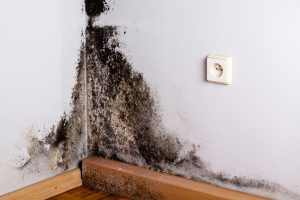No matter how clean you keep your home, there’s always the potential for mold growth. What’s worse is that it isn’t always easy to detect when a type of mold is present. But make no mistake, it’s important to remain vigilant about mold prevention—particularly when it comes to black mold, which only takes a day or two to start growing.
What is it and what are some of the long-term effects black mold exposure can have on your health? Keep reading to find out.

What Is Black Mold?
Black mold is an umbrella term for a dangerous species of mold often found in homes.
Typically, homeowners can expect to find black mold in damp, warm areas such as sinks, tubs, faucets, grout, pools, toilets, and vents. Furthermore, black mold thrives in areas where dust and dirt accumulate.
In some areas, such as a tub or sink, homeowners can clearly spot mold growth and clean it accordingly. However, when it comes to smaller areas (such as vents), the threat becomes far more difficult and the presence of black mold is often unknown until it’s too late.
What Are the Long-Term Effects Black Mold May Have on My Health?
Make no mistake, black mold can be quite dangerous. In fact, each year, thousands of people make trips to the emergency room due to the annoying fungi. Here are a few symptoms of exposure to be on the lookout for:
Common Symptoms
Knowing what to look for can be difficult, particularly as a lot of the health effects are commonly associated with other illnesses, particularly allergies and the common cold. Among these symptoms are sneezing, itchy eyes, runny noses, and sneezing.
As you can see, these are pretty common symptoms of your basic allergies, something 50 million people struggle with. However, if these symptoms remain persistent, it’s time to see a doctor. Especially when paired with more dangerous symptoms like the ones mentioned below.
Respiratory Issues
One of the biggest signs mold may be present is sudden difficulty breathing. These issues are only exacerbated in those who already struggle with asthma.
Pay attention to your breathing. If it becomes shallow, if you notice wheezing, or if you feel a frequent need to cough, you may want to be concerned.
Cognitive Struggles
Astoundingly, black mold exposure has been linked to long-term effects on cognitive health. For instance, feelings of confusion are frequently reported among those often exposed to mold, as is a sense of “brain fog,” which makes it hard to concentrate or follow a basic train of thought.
Black mold exposure has been linked to anxiety disorders, as well.
What Should I Do If I Have Mold Poisoning?
If you or someone you know may be suffering from mold poisoning, seek medical assistance immediately. While certain medicines can roll back some effects of exposure, black mold can cause long-term illness, as well.
Next, schedule a mold inspection and removal for your home.
Finally, if you believe that you may have been exposed to black mold due to negligence or a poor home inspection, get in touch with a personal injury lawyer.
Get Your Health and Home Back
Everyone deserves a safe living space. But when mold invades, your happy home can become a dangerous breeding ground for harmful molds.
If you’re the victim of long-term black mold exposure, get in touch today. Gebhard Law Office in Milwaukee can help you determine if hiring a toxic mold lawyer for your case is justified.
